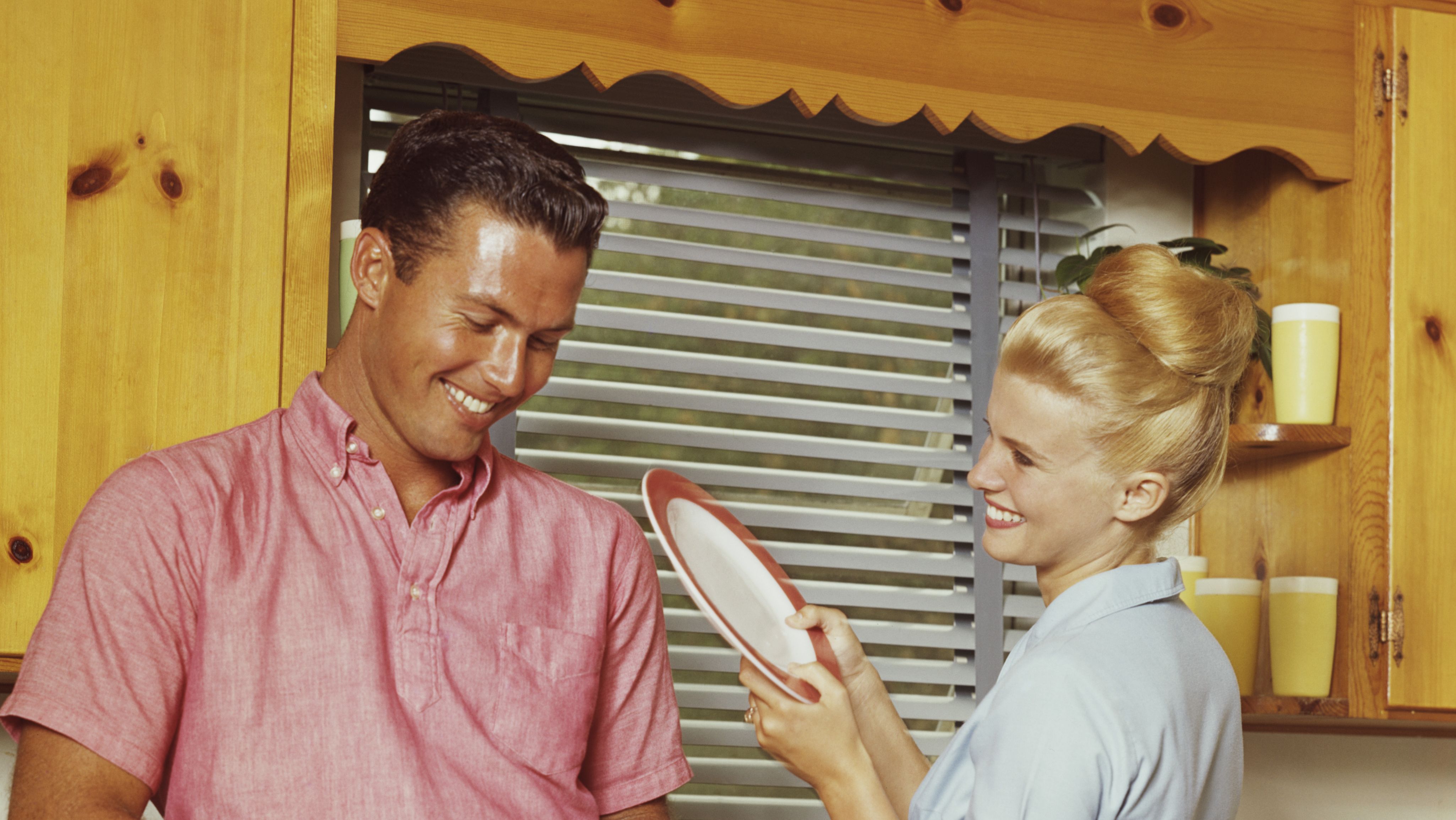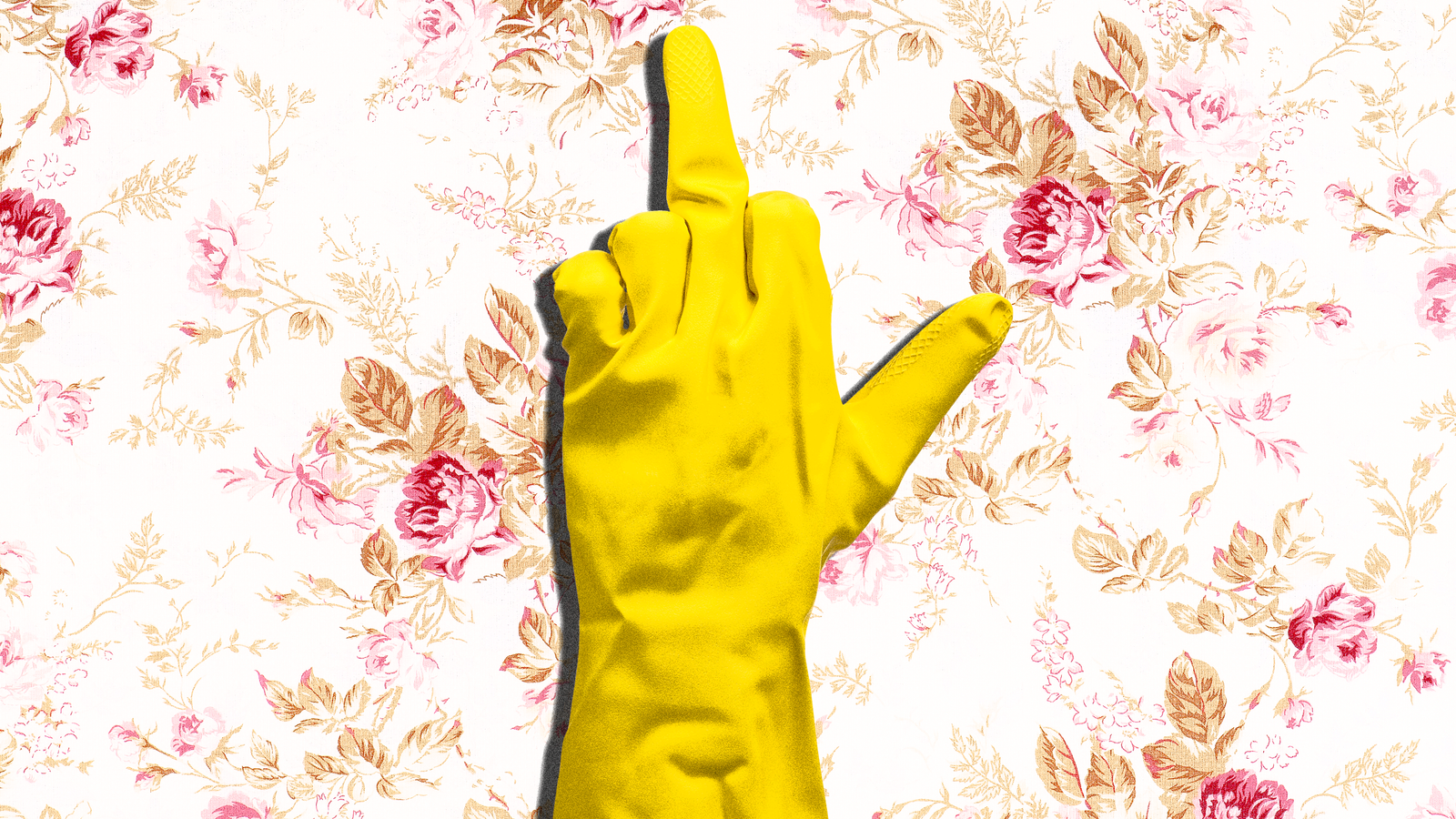Who Does the Dishes in Your Relationship Could Have an Impact on Its Success
New research shows men and women have distinct preferences when it comes to household labor—and that can impact relationship happiness.


The gender revolution has arrived, and it can be measured in chores.
Researchers made national headlines in 2016 when they issued a report that showed couples who shared the housework had more sex and greater sexual satisfaction. Forget about lingerie, date nights, or romantic weekends away—the couples likely to be having the best time in bed were those who were doing the laundry together, or at least rotating the responsibility every other week.
Researchers Daniel Carlson, Amanda Miller, and Sharon Sassler are out with new data on the subject, and offered a sneak peek to MarieClaire.com. Here's what they found: It's not just about an equitable division of labor; the types of chores men and women share make a difference in their marital happiness. Men want to share the shopping, and women want to share the dishwashing.
Husbands who embarked on grocery store runs with their wives reported greater sexual and relationship satisfaction than those who had to make all the trips Costco or Whole Foods on their own. Before you get all "Duh, no one wants to stand in line at Costco by themselves" on me, here's another surprising find: It's not even about passing the task off to someone else. Duty-sharers reported greater satisfaction than those who relied primarily on their partner to keep the kitchen stocked.
It's not just about an equitable division of labor; the types of chores shared make a difference in marital happiness.
“I suspect the pleasure that comes from shared shopping is that it very much stands in for shared decision-making,” says Stephanie Coontz, head of Council on Contemporary Families, which commissioned the report. “Couples who share shopping are clearly sharing something more than that. They're sharing decisions about what to buy, what to cook, and trusting each other's judgment.”
But it was a full sink that was the true libido killer, especially for women. According to the study, women are particularly unhappy with their relationship if they perceive that they’re doing the bulk of the dishwashing. The millennial ideal includes a two-person wash-dry routine, rather than the little woman stacking plates into her dishwasher alone, pods of Cascade Complete in hand.
“Dishes are a very visible chore; you can’t not do dishes,” says co-author Miller, an associate professor of sociology at the University of Indianapolis. “It’s a dirty chore and it never ends.”
Get exclusive access to fashion and beauty trends, hot-off-the-press celebrity news, and more.

Sassler, a professor in the Department of Policy Analysis & Management at Cornell University, and one of the paper's co-authors, suspects that it was the in-tandem nature of dishes that women preferred. “You wash, I dry (or vice versa), meaning that couples can do it together, while talking. Or they can take turns, meaning that one partner does not feel put upon every night. It seems to be mainly about not having to deal, all alone, with the huge stack of dishes in the sink,” she explains.
In addition to the precise kinds of housework that correlate with strong feelings of relationship harmony, the study showed that more couples are striving for equity—a change that started in the 1990s and continues to today, across many income levels.
“This was a sample of couples who are moderately educated with moderate income,” says Miller. “Normally when people think about egalitarianism and equal sharing, they are thinking about elites or highly-educated. We're able to show that it actually matters for a larger swath of the population than we thought.”
“When people think about egalitarianism, they're thinking about elites. It actually matters for a larger swath of the population.”
But as with any relationship between two people, the division of labor that comes with a household and kids is complicated and often hyper-personalized. If one of us prefers to fold a towel a certain way, then perhaps we should be the one to fetch the clean clothes from the dryer.
Sarah and John Zwier, a married couple in Minnesota, feel, like many parents, that their struggle to divide the chores is an ongoing one. “My tolerance for mess is much lower than John’s,” says Sarah. “I notice that something needs to be done before he would. If I wanted him to do the laundry, or clean the bathroom, I would have to tell him it’s time. ”
Sarah describes herself as the “house manager,” which speaks to emotional labor in a home that women typically shoulder and in turn influences the decisions they make on how to divide the work. Sarah does the bulk of the Target runs, because she feels better equipped to know what they need. “Like, if it’s body wash we need to get, I prefer to be the one to get it, rather than having him text me from the store, asking, ‘Which kind do we need?’” she explains.
John, meanwhile, is on kitchen duty. “I make a mess in the kitchen, so if I make dinner then I am definitely cleaning up afterward,” he says. “But even if Sarah makes dinner, I will still offer to clean up.”
They both acknowledge the role that chore-harmony plays in their day-to-day satisfaction and have periodic conversations to recalibrate. For many couples, it's the perception of unbalance that leads to negativity, Miller notes.
“We talk about it once every few months,” says John. “If Sarah feels she has started taking on more than is fair, we talk about what things can be shifted, and what I can pay more attention to to ensure it comes out more equal again.”
Note: This study focused on couples with kids, but those without would be wise to start establishing egalitarian patterns too.
This article was updated on July 2, 2019 to clarify some of the research details.
RELATED STORY

Rebecca Gale is an award-winning journalist covering the nexus of politics and people in Washington, D.C. She is currently a writer with the Better Life Lab at New America. Her work has appeared in The Washington Post, Roll Call, Marie Claire, Cosmopolitan, and Health Affairs, among other outlets. Follow her on Twitter @beckgale
